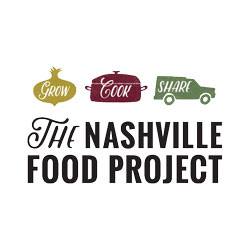
The Nashville Food Project’s Chief Executive Officer C.J. Sentell shares why food and nutrition are critical components of health equity.
Q: What is your organization’s mission? And, why are food and nutrition access critical components of health equity?
Sentell: “The Nashville Food Project brings people together to grow, cook and share nourishing food, with the goals of cultivating community and alleviating hunger in our city. We embrace a vision of vibrant community food security in which everyone in Nashville has access to the food they want and need through a just a sustainable food system. Now, it is critical to acknowledge that a just and sustainable food system has never existed in this country, and that has huge impacts on health equity in the present. For example, our everyday lives continue to be shaped by the effects of slavery and segregation in this country, and population-level health effects on Black communities in particular are a direct result of these legacies. These (and other) health inequities are disparities in individual and community health outcomes caused by unjust social conditions that disproportionately affect certain groups of people. Access to social infrastructure like transportation, grocery stores, and employment opportunities can vary drastically by neighborhood and directly impact access to healthy, affordable food. These factors have people reaching for whatever food is most available or easiest to prepare, which is typically not the most nutritious or healthy option.”
Q: How are you and your organization working to improve the health and/or well-being of Nashvillians?
Sentell: “As Nashville has grown, structural inequalities have worsened the equity gap between residents and stratified neighborhoods, leaving some at higher risk for poor health outcomes than others. The pandemic only exacerbated these gaps. According to the 2021 Metro Nashville Community Needs Evaluation, at least half of all households in Nashville live below the living wage income needed for basic household requirements, and more than 1 in 10 Nashville residents lacks access to food. At the same time, while thousands of Nashvillians are struggling with food insecurity, fully 40% of all the food grown in this country ends up in the landfill. To address health equity in our community requires collaborative, systematic action.
The work of TNFP begins with the reality that food insecurity is not a problem of scarcity. The problem is getting it to the people who need it in an efficient, effective way. Our programs support people facing either health, social, economic or cultural barriers to healthy food access, including people experiencing poverty, seniors (19% meals served), immigrants and refugees (6%), children (48%), and other individuals faced with food insecurity. TNFP’s approach to positive health outcomes begins with prioritizing nutritionally-dense foods, ensuring each meal contains 2-3 servings of a variety of fruits and vegetables. In 2021, fully 82% of TNFP meal guests reported increasing the amount of fruits and vegetables they eat in a typical week. Good, ready-to-eat food has a dramatic impact on the health of individuals. High poverty and the disintegration of communities have resulted in Nashvillians without enough food to eat and without the connections to community resources for support. At TNFP, we believe that food is the perfect medium to unite people in deep ways.”
Q: If you could wave a magic wand and solve one public health issue right now, what would it be?
Sentell: “Wow, what a tough question! If I had a magic wand and could solve one problem, I would undo the influence of multinational corporations on our food and farming sectors, which includes the way the federal government supports farmers. In most of the world, for example, governments support farmers themselves remaining on the land and growing food, while in the U.S. this support takes the form of subsidies for specific commodities and crops. In this way, so many of our state and federal policies around food and agriculture are distorted by the interests of big business, and this affects the health of our families, our communities, and our planet. In this new world, small- and medium-sized farms would once again supply most of the food needs of local communities. Local land policies would value the role of these farms in preserving green space, protecting ecosystems, and nourishing communities.”
Q: What are you most optimistic about right now when it comes to your organization and improving Nashville’s health?
Sentell: I’m most optimistic about the collaboration I see happening across the city. Organizations working on seemingly different problems are beginning to realize that collaboration and coordination is required to solve the most trenchant problems that face our city.”
Q: How can people get involved/help your cause?
Sentell: “The core mission of The Nashville Food Project is to bring people together through food, and we do that every day in our kitchens, in our gardens, and around tables across the city. We welcome anyone and everyone to join us in advancing the cause of community food security in Nashville. If you’re interested in volunteering, we have opportunities six days a week in our kitchens and seasonally in each of our gardens. Join us for a “best use” prep session where we process weekly bulk donations from incredible partners such as Costco and Bells Bend Farms. There are opportunities to volunteer in our gardens during the growing season, and you can also help the Food Project by collecting specific food items needed by our kitchens and partners. Finally, of course, you can make a financial contribution. We simply cannot do the work we do without the generous philanthropic support of people all across this city. To make a gift, visit our website here or contact me directly.”
NashvilleHealth creates a culture of health and wellbeing by serving as a convener to open dialogue, align resources and build smart strategic partnerships to create a bold plan for health and wellbeing in Nashville.
Check out our latest newsletter© Copyright 2025 NashvilleHealth

